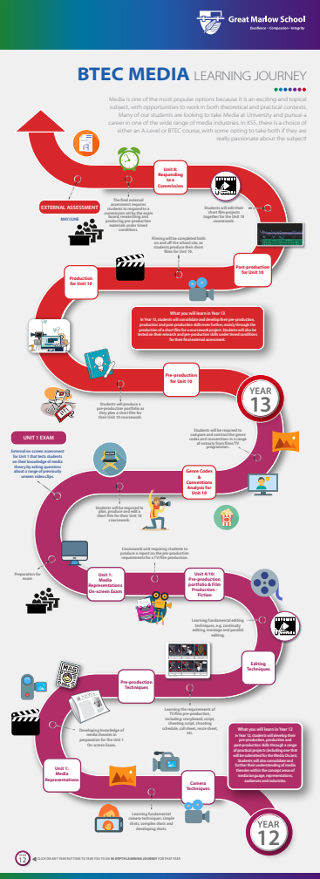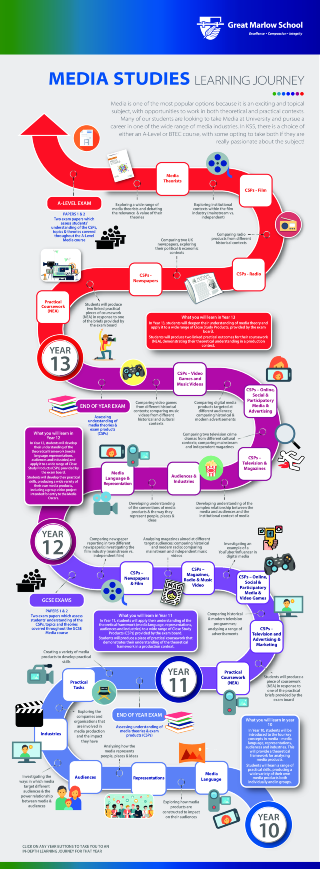
Telephone - 01628 483 752
Company Registration No.07690054
- Welcome
- News & Events
- About Us
- School Life
- Canteen & Catering
- Careers Programme
- Duke of Edinburgh’s Awards
- House System
- Library
- Lockers & Bicycle Racks
- One to One Laptop Scheme
- Parents’ Evenings
- Prefects: Sixth Form & Year 11
- Safeguarding
- School Nurse
- School Transport
- Student Support and SEN
- Teacher Training
- Transition to Year 7
- Uniform, Hair, Jewellery, Phones
- 6th Form
- Curriculum
- Parent & Carers
- Attendance Guide
- Bucks Family Information Service
- Bucks School Transport
- Communication & Catering
- Friends of Great Marlow School
- Information Evenings
- Gift Aid
- Letters Home
- Mental Health Support
- Online Safety Resources
- Parent/Carer Services
- Progress Review Guides
- School Uniform Shops
- Special Educational Needs
- The Voice – School Newsletter
- Student Area
- Sport
- Gallery
Media Studies
 ABOUT MEDIA STUDIES
ABOUT MEDIA STUDIES
The mass media is one of the world-changing phenomena of the last one hundred years. We are constantly surrounded by media products that compete for our attention, while the technology behind the media is changing and advancing all the time. It is easy to argue that the mass media not only reflects our values and attitudes, but also has an influence in shaping them. Placed in this context, it is easy to see that media studies is a fascinating subject, which provides students with the opportunity to assess, analyse and produce a range of different media products.
Media Studies is a very popular choice for students who appreciate a subject which is academic in its foundation but also provides opportunities to apply learning in a practical context.
- Media Studies at Great Marlow School
- Learning Ladder
- Wider Curriculum
- Key Stage 4 – GCSE Media Studies
- Key Stage 5 – BTEC Level 3 Creative Media
- Key Stage 5 – A Level Media Studies
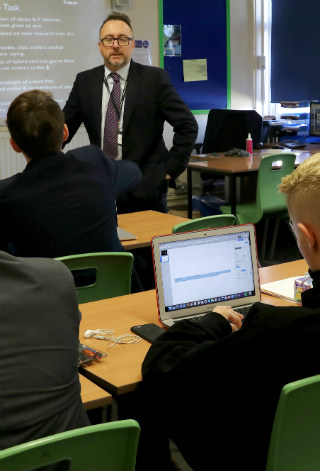
MEDIA STUDIES AT GREAT MARLOW SCHOOL
Media Studies is one of most popular option subjects at Great Marlow School and continues to attract high numbers of students and achieve excellent results year on year. Students are offered the opportunity to analyse and engage with a wide range of media products, helping them to develop an understanding of the distinctive forms and conventions the media industry uses.
Students learn how to produce and evaluate their own media products. They learn, too, how to consider the implications of media representations of individuals, groups, events and issues. Importantly, students explore the relationship between the production of media products by institutions and their consumption by audiences. It is a very popular choice for students who appreciate a subject that is academic in its foundation but also provides opportunities to apply learning in a practical context.
The department has an excellent range of resources, including HD camcorders and Apple MacBook Pro laptops equipped with industry-standard software.
WIDER CURRICULUM
The Wider Curriculum allows students to take a further interest in their subjects and subject related material they study at school. The Wider Curriculum also enables parents and carers to actively engage with the opportunities offered by each department. Each PDF is hyperlinked, so when you click on them, the links will take you to areas where you may read, view, listen, visit and be creative.
| MEDIA WIDER CURRICULUM KS4 | MEDIA WIDER CURRICULUM KS5 | |
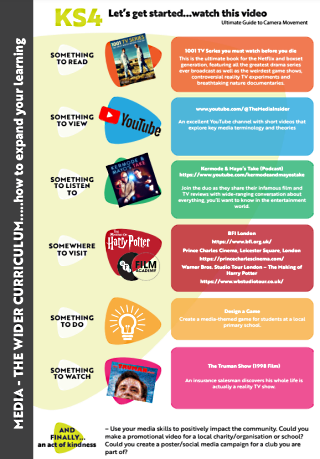 |
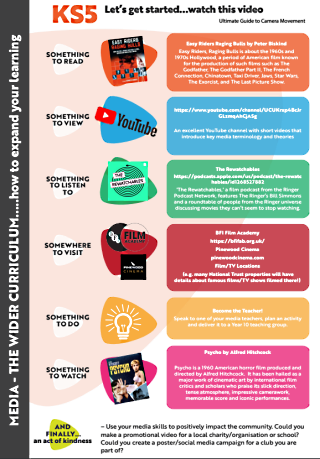 |
KEY STAGE 4: GCSE MEDIA STUDIES
The department offers the AQA GCSE Media Studies Specification (8572 – Single Award) which is 70% exam, 30% non-exam assessment (formally known as coursework).
GCSE YEAR 1 – Year 1o (This is a new course for 2017 -2019)
MEDIA STUDIES (AQA 8572)
The GCSE Media Studies course blends theoretical and practical approaches to studying the media. It is an exciting and contemporary subject that could open many doors to further education and a future career in the media industry.
Mass media play an important role in our society, providing us with entertainment and information. The media also have a significant effect on our attitudes and social values. This course will enable students to develop a critical understanding of the role of mass media in our society. Students are introduced to new ideas and topics, exploring a broad range of media products from social media and advertisements to films and television programmes.
As well as analysing the media, students will have the opportunity to produce their own media products. The department is fully equipped with a suite of industry-standard Apple laptops. Media students are trained to use software that allows them to edit video, manipulate images and construct audio pieces. The department is always proud of the quality of the practical work that students produce.
AQA will provide a ‘Close Study Product’ pack which specifies a range of ‘set texts’ that we will study throughout the two year course. These set media products will be the focus of the majority of questions in the final examinations.
Assessment The course is assessed through:
- Written examinations – 70% of the final grade
- Non-exam assessment (coursework) – 30% of the final grade
Written examinations – There are two exam papers, each 90 minutes in length (each worth 35% of the final mark). The examinations test students’ knowledge and understanding of media language, representations, industries, audiences and contexts.
Coursework – The non-exam assessment is based on a choice of topics related to a theme chosen by the exam board and will include both written and practical work. All assessments are targeted at the full range of GCSE candidates and, therefore, are not tiered.
Grades 9 to 1 are available.
You can find further information on the AQA website: www.aqa.org.uk/subjects/media-studies/gcse/media-studies-8572
GCSE YEAR 2 – Year 11 (This is the final entry year for this course)
Term 4 – Controlled Assessment 3 – Moving Image – Film Trailers (30% of total mark)
- Written Assignment – candidates are required to show evidence of planning and research in a pre-production folder investigating film trailers; and write an evaluation of the finished trailer produced in the practical assignment.
- Practical Assignment – develop and execute a trailer of approximately two minutes duration for a feature film aimed at a specific audience.
Term 5 – Exam Unit (40% of total mark) The topic of the examination changes each year:
- Television Game Shows (2017) and Serial Television Drama (2018)
The examination takes a case study approach and builds upon the media knowledge and skills developed throughout the course. Candidates are expected to research and investigate the specific media topic of that particular academic year. A brief will be pre-released four weeks prior to the external assessment date, giving candidates time to research and plan for the examination. The examination is 1½ hours and comprises four tasks.
You can find further information on the AQA website: www.aqa.org.uk/subjects/media-studies/gcse
KEY STAGE 5 BTEC LEVEL 3 NATIONAL EXTENDED CERTIFICATE in CREATIVE DIGITAL MEDIA PRODUCTION
Why study the BTEC Level 3 National Extended Certificate in Creative Digital Media Production? The Department for Culture, Media and Sport estimate that the UK’s creative industries are worth £36 billion a year and employ 1.5 million people in the UK. The UK’s creative industries have been identified as a strategic growth sector by the government. By studying this course you will develop the practical skills, knowledge and understanding needed for working in the media industry and achieve a nationally recognised qualification that focuses on the creative digital media sector.
Entry requirements Students should have achieved at least a Grade 5 in their GCSE Media Studies. If you have not studied Media at GCSE you need a Grade 5 or above in English Language and/or Literature.
This is a two year full time course which will be equivalent to one A-level. This course offers you the opportunity to learn skills from a wide range of media production areas related to the television and film industries. You will have many opportunities to produce media products throughout the course: examples include short films, music videos and advertisements. You will learn film and video editing techniques using industry-standard software.
Subject Content The units you will study are:
- Media Representations – onscreen exam (externally assessed)
- Pre-production Portfolio – coursework assignment
- Responding to a Commission – externally assessed assignment set by the exam board
- Film Production: Fiction – coursework assignment
Each unit within the qualification has specified assessment and grading criteria. A unit grade can be awarded at pass, merit or distinction.
Progression Students can go on to study degrees in media or film production. This qualification will provide essential skills and prepare you for a career in areas such as TV or film production, advertising, marketing and media research.
KEY STAGE 5: A-LEVEL MEDIA STUDIES
A-level Media Studies requires you to view, evaluate and analyse a variety of media products, and develop practical skills spanning a range of media forms. You’ll find contemporary, diverse topics and varied, engaging content, to help you develop research, problem-solving skills, while developing your creativity. You’ll also refine your debating skills through discussion of contemporary issues from a range of perspectives.
The A-level specification offers a smooth progression from GCSE Media Studies but will also review and develop students’ understanding of core principles, which means that students who are taking Media Studies for the first time will quickly gain a sound understanding of the foundations of media theory. You will also extend your practical skills in your chosen medium, building your capacity for independent research, while gaining a deeper appreciation and understanding of the role media plays in day-today life.
Subject Content
A-level Media Studies engages you in the in-depth study of media productsin relation to the four areas of the theoretical framework:
- media language
- media representation
- media industries
- media audiences.
You will study media products from all of the following media forms:
- audio-visual forms (TV, film, radio, advertising and marketing, video games and music video)
- online forms (social and participatory media, video games, music video, newspapers, magazines, advertising and marketing)
- print forms (newspapers, magazines, advertising and marketing).
AQA will provide a ‘Close Study Product’ pack which specifies a range of ‘set texts’ that we will study throughout the two year course. These set media products will be the focus of the majority of questions in the final examinations.
A-level Assessment
The course is assessed by exams (70%) and coursework (30%) which is a non-exam assessment.
Paper 1: 2 hour exam. Worth 35% of the total A-level grade.
Questions will focus on media language, representations, industries and audiences. Questions test the following forms: advertising and marketing; music video; radio; newspapers; film (industries only).
Paper 2: 2 hour exam. Worth 35% of the total A-level grade.
Questions will focus on the in-depth media forms of television, magazines and online, social and participatory media/video games.
Non-exam assessment: Creating a Media Product. Worth 30% of the total A-level grade.
AQA will provide a selection of coursework briefs that you can choose from. This will give you the opportunity to create two linked practical products that demonstrate your knowledge and understanding of the theoretical framework and the production skills you have built up throughout the course.
Progression
Students can go on to study degrees in media. This qualification will provide essential skills and prepare you for a career in areas such as TV or film production, advertising, marketing and media research.
